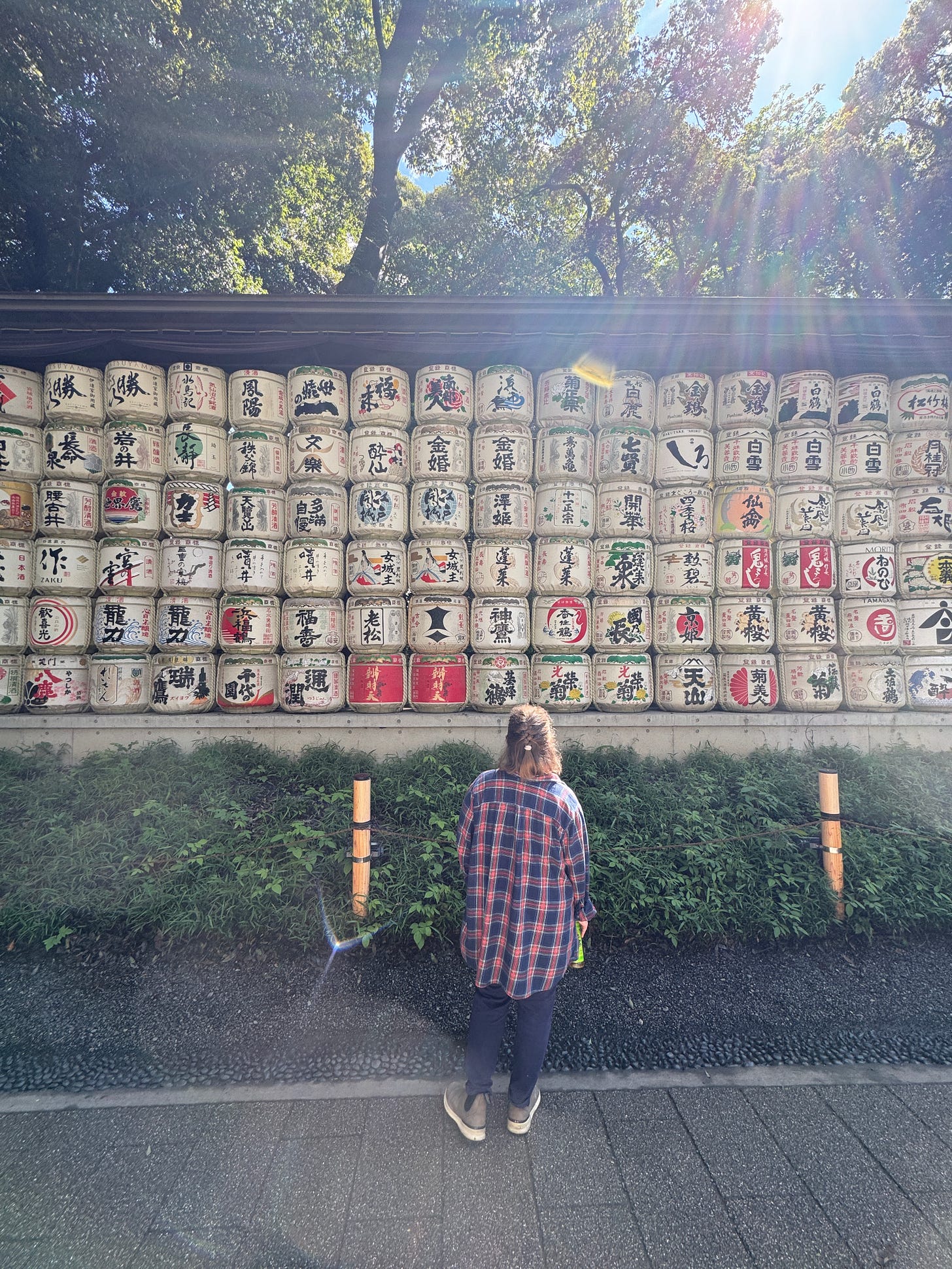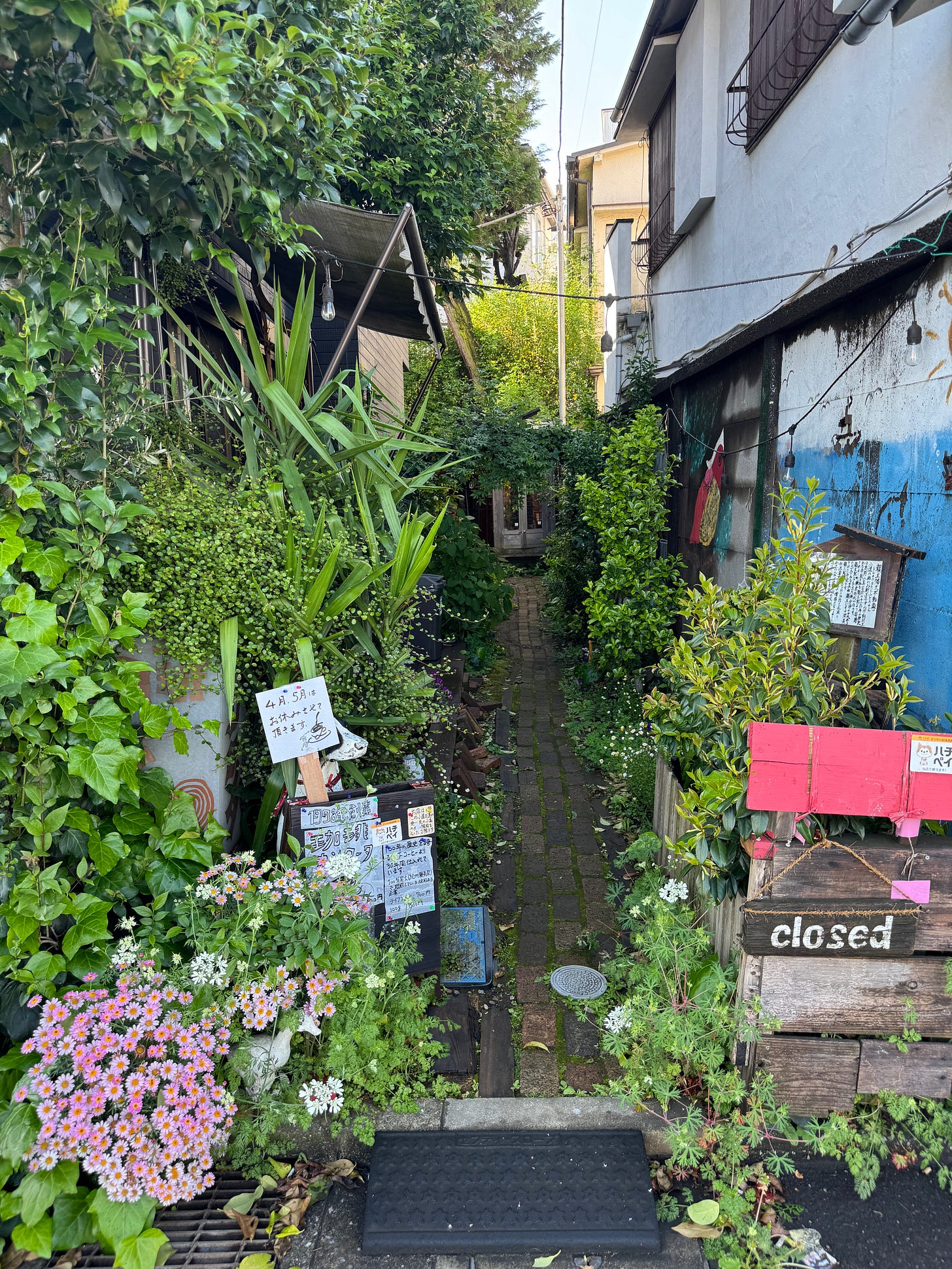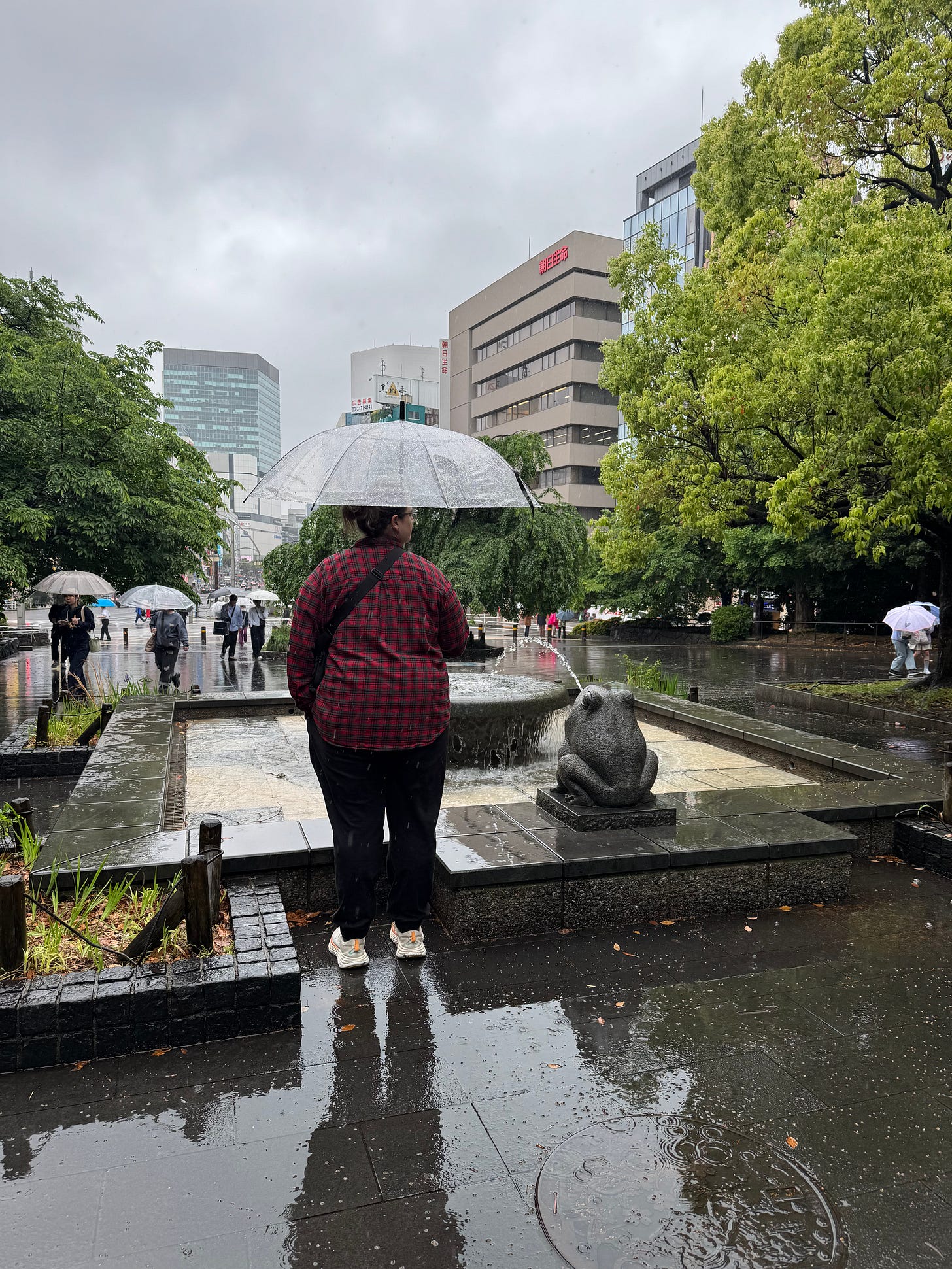July
my heart stops every time
It’s been an introspective summer.
We’re finally back from our two-month stay in Atlanta. It was the first full, deep break I feel I’ve gotten since we moved to Boston.
Back in April, we spent two weeks in Japan for our honeymoon. We visited Tokyo and Kyoto, and I cannot wait to go back to spend more time in Kyoto and visit Osaka.
School
I’m teaching business communication this summer and applying a bunch of experimental pedagogies - some of which I’m presenting at the International Writing Across the Curriculum conference this weekend. Between preparing my materials for the For Real Final Round or I Quit Job Market Search coming up, collecting data from my classes, and developing this research presentation, I feel like I’m in a tornado of getting my shit together.
Femme Moon said it perfectly in one of their recent newsletters:
We wish to “have our shit together” but what that looks like realistically, idealistically, functionally all vary drastically. Summer 2025 wants something greater for all of us, but we have to get un-stuck if we’re going to apply the knowledge of our processing and move on from it. Perhaps a shiny door to something new altogether. That path may be a much needed change, a step forward from stagnation.
I feel like I’ve been hyper on the lookout for a shiny door to something new. My study of student engagement has led me to develop course plans that center mostly on facilitating enriching environments for rhetorical invention. So far, it seems like a focus on time management and mental wellbeing seems to be helping my students effectively tackle their research choices.
Again, Femme Moon offers me inspiration when I dream of the kind of class environment I want for my students:
We can choose to really observe how our personal energy ebbs and flows, how we deal with other people’s personal paces, where/how/when we tend to gain the most momentum. Pausing to prepare for fine-tuning our personal timing can honestly upgrade YOUR ENTIRE LIFE’S WORK.
I believe that taking time to reflect on our identities, experiences, and relationships has really motivated my students and me to think about our role within our research and experiential learning. These intentions behind my current pedagogy are inspired by deeply insight pieces of literature I’ve read over the past few months.
Some of these books I’ve already raved here, but I wanted to briefly talk about them together as a collection.
Real Good Texts
It’s Okay Not to Look for the Meaning of Life (2017, 2023)
Jikisai Minami
Jikisai Minami is the chief priest of Osorezan, a Buddhist temple in Aomori Prefecture. This book was first published in 2017 and translated into English in 2023. It called to me from the tiny English section at the Tokyo National Museum, and from the moment I started reading it, I felt like Minami was speaking directly to me.
Minami draws from his decades-long career as a spiritual advisor to deliver simple, profound expertise on how to live a happy life. A large part of his argument is that our lives aren’t necessarily meant to be extraordinary and that life itself doesn’t have to have a purpose in order to be lived well. I’ve always shared this perspective but have never been able to express it in a non-doom-and-gloom way. The hopeful way Minami discusses the freedom in a purposeless life is deeply comforting.
This book isn’t for everyone, but I think it’s especially good for those who’ve endured the heaviness of chronic depression. Minami addresses life problems practically and neutrally, and he offers advice for dealing with emotions that get in the way of this perspective. A lot of his advice helps with all of the things that we do to get in our own way. He does not offer a recipe for greatness. But instead he teaches strategies for riding the natural waves of emotions and mastering “the art of getting off the emotional wave.”
I felt like his words were a salve to my heated soul.
Doppelganger (2023)
Naomi Klein
As Minami’s book guides me through my interpersonal relationships, Klein’s Doppelganger is a manual for movement through my relationship with sociopolitical issues. I appreciate Minami’s strategies when dealing with my own issues, but I so often feel plagued by the anxiety that comes from issues out of my control. Reading Klein’s words helped me understand why I feel the way I do about world and where I can go to seek community.
For me, Doppelganger demonstrates the very definition of intersectionality. Through the narrative of her ongoing relationship with her doppelgänger, Klein presents a comprehensive guide of the complex intersections between social and political issues exacerbated by the COVID pandemic. One of my favorite things about this book is that every sub-argument she makes isn’t groundbreaking on its own - but the connections she illuminates between these arguments reveal profound and relatable insight into why it feels like two realities have emerged from our current sociopolitical situation.
Additionally, the concept of the doppelgänger - which Klein thoroughly analyzes - is an interesting lens to apply to our personal identities. Studying my feelings and experiences through the phenomena of doubling, creating binaries, and othering has enhanced my understanding of my relationships with people and myself.
Braiding Sweetgrass (2013)
Robin Kimmerer
I cannot talk about this book enough. But the more I explain it, the more I feel like people should just go read it for themselves. In this book, Kimmerer presents an autobiography through which she delivers some of the most insightful life lessons I’ve ever read. Her view of the world is so gentle, loving, and holistic, and I aspire to be like her in so many ways.
If Kimmerer wanted to be the President of the United States, I would vote for her. If she wanted to start her own cult, I would join immediately. Every word of Braiding Sweetgrass is a beautiful argument for dismantling every oppressive system in our country so we can finally find peace and abundance, and I think everyone should read it.
Writing
New writing ideas have bloomed this weekend at the IWAC conference. My colleagues from Georgia College presented on a panel yesterday on “Writing Across the Curriculum in the Age of Generative AI: Sustainability, Innovation, and Human Agency.” The first panelist grounded the session in a discussion about AI’s environmental effects while another panelist discussed administrative leadership’s role in preserving human agency.
My colleagues posed the question “Can AI support meaningful writing?” followed by “Can AI support writing tools without undermining human skills?” The spectrum of inquiry on this panel made me realize that my own relationship with AI involves two layers: my relationship with the AI tools I utilize in my own work and my relationship with research on AI development. Together, these layers reveal my emotional state about the future of AI and my role within this future.
My business students - who just turned in their partial research paper drafts this week - are also dealing with these layers, which makes their research super interesting to follow. Here are a few of the topics my students are covering this semester.
AI and human labor:
“In recent years, artificial intelligence has emerged as one of the most transformative technologies shaping the global economy. As AI systems grow more capable, handling everything from customer service to data analysis, concerns about machines replacing human workers have gained substantial traction in the public. Headlines often warn of a future where automation leads to widespread unemployment and a diminished role for human labor. However, this view presents only part of the story. Rather than eliminating the need for people, AI is increasingly being used to assist and empower them, taking over repetitive tasks while enabling workers to focus on more creative, strategic, and interpersonal aspects of their jobs. In reality, the future of work is not about humans versus machines, but about how humans and machines can work together.”
AI in accounting:
“The main attraction of A.I. in this field is the potential of eliminating repetitive and tedious tasks. This ability alone will allow accountants to focus more on difficult problems and expand their clientele. Already we are able to see how much A.I. has been helping with productivity. A study surveying 277 accountants with varying use of A.I. found that those who have adopted A.I. supported fifty-five percent more clients (MIT). This was mostly due to how their time was able to now be allocated, improving the workflow.”
AI in quantitative investing:
“Investment firms have watched the industry transform vastly over recent years, with artificial intelligence and machine learning technologies completely redefining how they approach decision making. Traditional quantitative strategies such as mathematical, data-driven approaches that have long been industry staples, are experiencing a significant evolution as AI capabilities become increasingly accessible and sophisticated. However, the integration of AI into quantitative investing is not without its challenges. Issues such as model interpretability, overfitting, and data privacy still remain as major concerns. Furthermore, regulatory researchers are beginning to look at how AI-driven decision making affects market stability and long term outlooks for the markets. These factors should be carefully taken into account as firms consider increasing their reliance on AI tools.”
AI in marketing:
“Artificial Intelligence (AI) is rapidly changing the business world and reshaping how companies are operating and connecting with their audiences. In the marketing field, AI is being embraced for its data analytics capabilities, efficiency, and automation while also being met with concern. While these benefits are allowing companies to rely on algorithms to drive personal experiences for customers, it raises questions about how the marketing landscape is going to shift. AI has increasingly become overused in this field. The creativity aspect of marketing is fading as companies are relying on AI which in turn is being recognized by consumers who no longer feel a human connection to marketing strategies.”
These examples show that, while my students are curious and sometimes even enthusiastic about the integration of AI in their fields, these young people are highly aware of the ethical, cultural, and economical flaws in how this technology is currently being developed. To foster this curiosity and encourage this commitment to ethical research and development, I have utilized experimental and diverse pedagogical theories when teaching about AI. These pedagogies have been inspired by my background in the food and drink industry, my current exploration of Indigenous Knowledge Systems, and my experience at a liberal arts institution.
Over the next few weeks, I plan to explore this question of how AI contributes to, influences, and/or diminishes meaningful writing experiences, and I’m interested in how our (my students and my) multidimensional perspectives as people who both utilize AI tools individually and reflect on AI usage holistically inform our understanding of ourselves as interdisciplinary research writers.
Thank you Fort Collins, Colorado for being a nourishing environment for critical thinking and creative expression.





